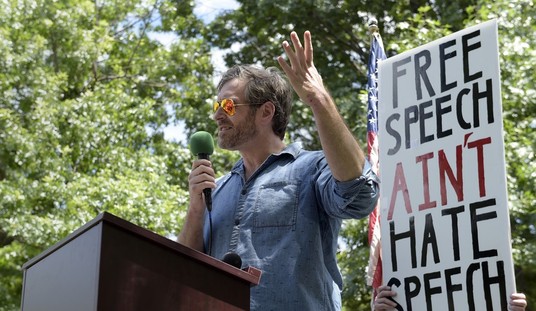“Prejudice is like Nature in the famous line from the Epistles of Horace: you may toss her out with a pitchfork, yet she will soon return.”
Lies propel political correctness in the manner that oxygen fuels life. Without fabrication, melodramatic sacrifices to the shrines of sensitivity and diversity would be impossible.
Reality informs us that human beings, as a rule, are neither sensitive nor pluralistic. Our species intrinsically features both the fiendish and the beatific, yet our elites are oblivious to this fact. They pretend that only certain kinds of people possess goodness, whereas those who oppose them are evil incarnate. But their’s is a special type of evil, a product of miseducation and improper social engineering rather than birth.
Such is the way a person infected by prejudice becomes categorized. Our commentariat has even reached the point in which they are so offended by prejudice that they meld representations of it into scandals. James Bowman noted in his recent book, Media Madness, that the Fourth Estate, in 2007, met the news of the Pope being Catholic with wonderment and indignation.
At one time this phrase was used to describe information that was completely obvious. The Sovereign Pontiff’s proclamation that the identity of the church of Christ must be the Holy Catholic Church was another instance of it, yet the quotation stunned. Undoubtedly, no handbook on news style contains an entry explaining what to do upon encountering a figure who actually means what he says. Clearly, with his words, the Bishop of Rome failed in his multicultural duty to affirm both believers and unbelievers equally.
While cultural Marxism is vile, easy to ridicule, and often pathetic, it remains remarkably tenacious. The various areas of life in which it has insinuated itself still manage to astound. The other day an acquaintance told me of her being corrected for using the expression “that’s like the pot calling the kettle black.” Her overseer described it as being a racially offensive statement. We both thought it a humorous story but I guarantee she never uses the analogy again.
With so much effort devoted to constantly defending utterances, it is little wonder that conservatives fair so poorly against radicals in the marketplace of ideas.
One spends so many hours explaining why disagreeing with them is not indicative of racism or sexism that little time is left with which to mount a counterattack. That’s the situation most of us find ourselves in, but not Dr. Theodore Dalrymple. His new work, In Praise of Prejudice: The Necessity of Preconceived Ideas, delivers a deluge of resounding blows.
We find here that, in keeping with the Manichean manner of our elites, prejudice has become a word devoid of positive connotation.
Those who refuse to discard their preconceptions soon find themselves put up for membership in the “Church of Verbal Atonement.”
The author skillfully illustrates, however, that presuppositions are what made civilization distinctly possible. Discrimination once symbolized the possession of sensitivity, good judgment, and connoisseurship. Today it suggests a devotion to homophobia, bigotry, and racism. A word which once illustrated perspicacity has become a pejorative. Judging something better than something else is now deemed undemocratic.
Well, that’s not exactly true because the person who judges is regarded as the moral inferior of the person who refrains from judging.
Dr. Dalrymple contends that “it does not follow that because some prejudices are harmful, we can do without prejudices altogether.” As an example he points out that our daily habits are nothing more than a form of behavioral prejudice.
To not discriminate is to not learn from a lifetime of experience. Furthermore, no method exists by which one can completely eliminate prejudice. Prejudice of one kind is always replaced by prejudice of another. Referencing Karl Popper, he concludes “you could never get to a truth that was free of presuppositions.”
Via a syllogism he demonstrates that only prejudice allows us to separate good from evil. If preconceiving is wrong then separating good from evil is also wrong. Presuppositions are a precondition for ethics and values. Society is filled with many persons who embody such thinking as they judge no one. In the end, they become ignoramuses at best and nihilists at worst. The non-judgmental life is a sentence served in an environment of perpetual amorality.
Suspending discernment is akin to terminating the immune system. When one neglects to make use of their acumen they have no mechanism by which to assess the merits of their fellow citizens. Out of a fear of stereotyping, such persons will congregate with thieves, drug addicts, and gangsters. When such relations produce the inevitable result they will refrain from judging and mournfully remind themselves that not every thief steals and not every gangster commits crimes.
Previously, presumption lay on the side of authority. Now authority is an entity to be reflexively questioned. Of course, it’s never a case wherein all masters are mistrusted. The sole arbiter whose prestige remains undiminished is “oneself.” In our day: “Every proper man, then, is a Descartes on every subject and every question that comes before him.”
No one with any humility or knowledge of human nature can be pleased by this development. The past records the names of independent persons who believed that history can teach us nothing. Pol Pot and Robespierre are two such persons. They only surpassed their predecessors in one area: the amount of misery and suffering their reigns produced. Two millenniums illustrate the veracity of the law of unintended consequence. What we wish for is not what generally occurs. A far more pro-social value than non-judgmentalism is the recognition that things can always get worse.
Political correctness nefariously fills the void of principled authority. We may be hailed as authentic navigators of our own lives, but, should our decisions clash with societal edict, our words cannot extract us from difficulty. Dr. Dalrymple’s sentence — “Whatever I say will not avail me, for other people will claim to know my meaning better than I know it myself” — showcases the manner by which dogma has replaced reason. In order to find out what you really mean, the last thing anyone will do is ask.
Government’s dedication to non-judgmentalism has given rise to “an urban hell” in which certain groups of people — particularly those on the dole — are not expected to act in a civilized manner, as supporting them is no longer contingent upon the behaviors they exhibit. The Leviathan is above distinguishing right from wrong in the case of its wards.
What of the antiquated depository of morals we once referred to as “parents”?
They have since been rendered obsolete by the state’s role of loco parentis. Here the person without prejudice is of great use as he cannot advance the notion that biological parents are a superior influence upon offspring than are social workers or bureaucrats. Years ago society had a prejudice in favor of family life. Now it has one against it.
Children are regarded as being no different than adults in their ability to make choices. Parents, out of a need to revel in their child’s uniqueness, fail to pass on imperative preconceptions which would aid their offspring. A directionless child becomes an adult barren of parental prejudices, but remains one who has crystallized a multitude of his own along the way.
In closing, the questions Dr. Dalrymple posed in an article within the latest issue of National Review — concerning the archbishop of Canterbury — apply well to the dilemmas outlined here: “At what point does willful blindness become plain cowardice? At what point does intellectual incoherence become downright dishonesty?” Indeed.
Bernard Chapin wrote Women: Theory and Practice and Escape from Gangsta Island, along with a series of videos called Chapin’s Inferno. You can contact him at [email protected].









Join the conversation as a VIP Member